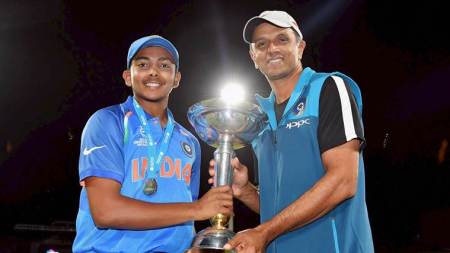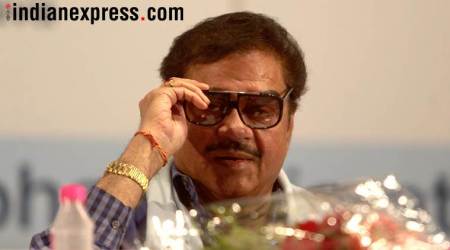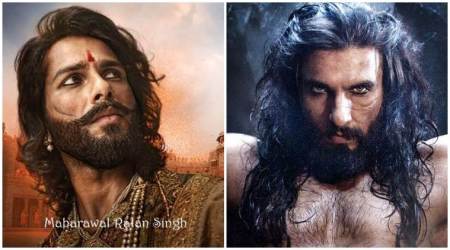 Sanjay Manjrekar in his playing days. (Express Archive Photo)
Sanjay Manjrekar in his playing days. (Express Archive Photo)
Former cricketer Sanjay Manjrekar on his autobiography, his difficult relationship with his father, his dogged insecurities and his love for Kishore Kumar
In your autobiography, Imperfect (Harper Sports), one phrase you use for yourself — a self-conscious public performer — stood out, perhaps, because it fits you so well.
Not so much self-conscious but conscious about measuring up to my own standards. As a public performer it should not matter what you think because you’re not performing for yourself but for the public. You might think you are terrible but people will come and tell you that you are quite good. But that is my nature — it’s eventually about how I feel. The worst thing I do is to look at my performance and dislike it. Now, I’m wiser, I just do my thing.
People felt the video of Sanjay Manjrekar interviewing himself during the book release fits the image they have of you being self-obsessed.
People who have got that perception have got me wrong. I’m actually somebody who doesn’t like to be in the forefront. When I’m hosting a show, it’s not about me, it’s about that show. I was at forward short-leg for my first Test and the last, when I was 10 years into my career. That is the definition of a team man. Cricket is a very small part of my life. It is work. In fact, if the discussion is not cricket, you will see me participating a lot more.
Was the chapter about your father the most difficult one to write?
When I started writing the book, I don’t think there was any definite path that I’d laid out. It was about things that impacted my life. My father (cricketer, Vijay Manjrekar) played in the ’50s and ’60s, so it wasn’t like talking about him would get people interested. But he had an impact on my life in a different way. I needed to address that. Some people might feel it’s a private thing, but I have got no problems with people knowing of my private life. The only people I was concerned about were my sisters. They read it and were absolutely fine with it.
You write about the insecurities you picked up at an early age that impacted your career. Do you think you have gotten over them with time?
I’m sure when the foundation is being laid, if something goes wrong, it will affect your adult life, too. But that is something I’ve made peace with. The fear with which I grew up (of his father) was there, but there were a lot of good things happening as well. There was a mother I felt close to, I had two wonderful sisters, an extended family; cricket from the age of 12 or 13.
That phase when you got a little arrogant, having come back from the West Indies tour in 1989, was that you becoming your father in any way?
No, the thing was, my father and I hardly interacted. There was no way for me to imbibe any of his traits. At a deeper, psychological level, I don’t know how that works out. The arrogance and the cockiness were based on my success at that time. That is where some people are blessed with a lot of maturity. For example, (Sachin) Tendulkar was so gifted that every time he went out, he found out that he was far better than the opposition. But never once did he become arrogant. You can see the same with Virat Kohli as well.
At many parts of the book, I felt like there are just two very different people in you…
Excellence drives me. I get very excited if somebody is exceptional. When I watch movies, if there is an exceptional performance I get emotional and I well up. In cricket, I enjoyed the Test matches, anything that I saw and felt was better than what I have done or I can ever imagine doing. Jonty Rhodes in the field, Imran Khan, Richard Hadlee, they made me crazy. I have a disdain for moderate, average performances. It’s not something that I’ll smile at and accept. The stage is meant for very special people.
Sachin Tendulkar used to call you Mr Perfect and Mr Different. At some point you write that it was difficult being different so I chose being perfect. You are kind of different.
Tendulkar used to think that I deliberately did things differently. In Singapore, around 1996, towards the end of my career, we’d gone to a watch shop and were looking at various watches. In the end, I picked up a watch that was called Revue Thommen, a brand nobody had heard of. I picked it up because I liked it. He kept telling everyone, Sanjay has bought a watch called Revue Thommen. He rested his case and that watch was his evidence.
 Those were the days: Sanjay Manjrekar with teammates Sachin Tendulkar and Mohammad Azharuddin
Those were the days: Sanjay Manjrekar with teammates Sachin Tendulkar and Mohammad Azharuddin
Your book is about perfection. Where did it come from? Did your insecurity play any part in it?
That’s the nature of things — like you wouldn’t know why you do certain things. When I started playing, it was about doing it properly. Not getting out and not taking risks could be related to insecurity, but wanting to play well was a natural thing. I am the same about everything, including my handwriting.
You are pedantic with your singing too. Your wife was surprised you liked your recent Rabindra Sangeet recording.
Yes, and, recently, in Nagpur, I performed at a family function. It was one of the few occasions where I heard myself and went, ‘Wow that’s good’. I have to develop that a lot more.
Why Rabindra Sangeet though?
From my obsession with Kishore Kumar. I have heard all his Hindi songs. Then somebody gave me a CD of his Bengali songs and I connected with the melody. That’s why it’s so popular and ageless. So, because he sang them, I heard them.
When did you discover your musical talent?
I used to take part in inter-school singing competitions, but there was one turning point. My chartered accountant has only cricketers and musicians as clients. Those are his two great loves. So, Suresh Wadkar had a little function at his place and that is where everybody started singing. Shankar, Ehsan, Loy were there and Kunal Ganjawala. Then Dilip Vengsarkar got me to sing as well. I sang and I could see people were generally surprised. That’s when I started taking singing seriously, and taking lessons to understand the basics. That was about 10-12 years ago. Since then, I’m really into it.
You mention repeatedly in the book that you got into cricket for fame. But you also write that being sensitive was one of your obstacles in achieving greatness. Those two things don’t go hand in hand.
I didn’t look at fame or recognition as a burden at all. I always enjoyed it and wouldn’t have it any other way. But I have found a way of handling public reaction. On Twitter, in the last three-four years, I have not looked at any notifications outside my followers. I only get notifications from people I follow. Again, I’m very sensitive there. Some idiot would have said something and I would still remember it more than the good things people say about me. That is my nature. Success for me is in fine print and failure is in bold.
There you were trying to be the best you could possibly be and there were also the likes of Imran Khan and Viv Richards who really looked at you with great expectations. Did it get too much?
My expectations were greater than all of theirs (laughs). I just set the bar too high for myself. That is the essence of all my troubles. I’m not happy with what I have. My negative qualities as a performer, as a cricketer, are now my strengths as a commentator — the over-analysis and all. As a cricketer, you don’t think too much and that’s an advantage. You just go out there and you brush off failures by saying he took a brilliant catch; I would think I played it away from the body. People like us become good commentators.
You write about teammates you couldn’t respect even though they were great guys. Do you think you made it worse for yourself by who you were?
Yes. In fact, I am a slight misfit in India. The way I think, the way I write — often I think I’ve written a benign piece, but the way Indians react to it always surprise me. I cannot connect with mainstream India and the Indian cricket team was mainstream. I didn’t fit into the culture where you could not say anything aloud, couldn’t air your opinions. I didn’t make that effort and I didn’t want to. If I was that kind of a person in an Australian or English team, it would have been ok.
You became the villain after criticising Sachin Tendulkar.
I knew that I was saying things but I had no idea about the kind of reaction that would come out of it.
Was there ever a point in this second innings in cricket, where you thought about toning your criticism down?
I’ve toned it down. I’m more careful. I’m also conscious of the fact that as I’m saying things that ought to be said, I don’t become a bitter person. Then you’ll start losing platforms. I have been able to draw the boundaries.
Bitter is a word that is used for a lot of people with the reputation of having a lot of potential and not succeeding to that level.
Bitterness comes when people feel injustice was done to them. When I quit, because I was always hard on myself, I held myself responsible. There wasn’t anybody else. Sunil Gavaskar tells me about a lot of people from his time who played 70-80 Tests but were still bitter because they felt they could have played more. I’m not at all bitter. I don’t think I was exceptionally gifted or talented. I think I might have overachieved with the talent I had at 15 or 16. Two years later, I was playing for Mumbai, and two-three years later, for India. And, when I was on a loose footing, people like Rahul Dravid and Sourav Ganguly were coming in.
Your commentary career is almost 20 years long, and cricket career was 10 years. At what point, does this become your actual career and the cricket becomes something you used to do too.
Actually, this has become my actual career and I’m very conscious of that. I don’t live in a fool’s paradise. The reason for writing this book is because I am still somewhat in the limelight. A lot of 20-30-year-olds know me more as Sanjay Manjrekar, the commentator. If I was not on television after finishing in 1997, I would not have written the book. And yes, I am more this than that. These are two separate people now. That happened a long time back.
Do you think the fame and success came too early to you?
I don’t think so. Even at 30, my problem wasn’t getting too carried away. It was my nature that came in the way. I know exactly what I would have done.
Apart from movies, do you have free time as a commentator on tours? Are you constantly on the lookout for new interests?
I have very limited interests. Even restaurants tease me that I go to the same place all the time. I don’t explore too much. I discover something and I just stick to that. At the moment, I have my hands full with Netflix. After that, I might explore something, but definitely not mountain climbing and all that.
For all the latest Sports News, download Indian Express App
















